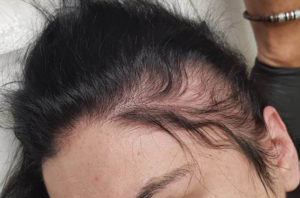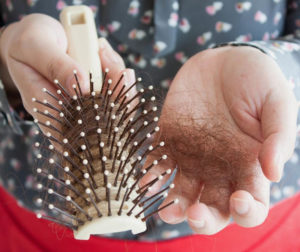Causes Of Hair Loss in Women
Hair Loss Experts At Anthony James Salon In Halifax
There are several causes of hair loss in women. It could be hormonal changes, stress or a medical condition. It can be hard to know the cause so please book in for a consultation with one of our hair loss experts at Anthony James Hair Salon in Halifax. Hair loss can be very upsetting so we always recommend you talk to your GP or a trichologist. Below are some of the signs to look out for if you are concerned about hair loss or hair thinning.
 Handfuls Of Hair: When you are washing or combing your hair, you experience handfuls of it coming out. It could be due to emotional and physical trauma and could lead to overall thinning.
Handfuls Of Hair: When you are washing or combing your hair, you experience handfuls of it coming out. It could be due to emotional and physical trauma and could lead to overall thinning.
Overall Thinning: Overall thinning starts gradually. Men tend to see a thinning around the hairline, whereas women's partings tend to become wider.
Bald Spots: You may experience bald spots that are the size of a 10p, appearing on the scalp. Your scalp can also feel itchy or even painful.
Full Hair Loss: There are some medications or side effects to medical treatments such as chemotherapy cancer treatments which can cause sudden hair loss, not only to your head but to the body too.
Alopecia: Alopecia is not contagious. It is caused by anything from genetics and even hair care practices or things that trigger the immune system which attacks the hair follicles. There are four types of alopedia:
- Androgenetic alopecia or female-pattern baldness tends to be genetic and can begin between the age of 12 and 40. In women there is likely to be an overall thinning.
- Alopecia aerate is patchy hair loss that happens suddenly on the head or body. It begins with one or more round bald patches that may or may not overlap.
- Cicatricial alopecia is a group of conditions that causes irreversible hair loss through scarring. Hair falls out and the follicle is replaced with scar tissue.
- Traumatic alopecia causes hair to fall out as a result of hairstyling practices such as tying your hair up too tightly, blow drying, straightening or certain chemicals.
Many Health Conditions Can Cause Hair Loss In Women
 Some medical conditions lead directly to hair loss, whether through disruption to hormones, such as thyroid issues; scarring from skin conditions like ringworm; or autoimmune disorders, like celiac disease.
Some medical conditions lead directly to hair loss, whether through disruption to hormones, such as thyroid issues; scarring from skin conditions like ringworm; or autoimmune disorders, like celiac disease.
Menopause and hormone imbalances can also result in thinning hair or hair loss. Menopause causes a reduction of oestrogen and progesterone which can result in hair loss.
Symptoms like menstrual cycle irregularity, night sweats, vaginal dryness, dry skin, and weight loss also add stress to the body, which can worsen hair loss.
Oestrogen levels will also fall if you come off birth control. This can disrupt the lifecycle of the hair which can result in hair loss.
Hair Loss Caused By Stress
Both emotional or physical stress may lead to hair loss. You may experience stress due to a family death, serious illness, or major surgery. Very often there is a delay around the three-month mark between the event and when you may see the hair loss.
Lack of B Vitamins May Result In Hair Loss
Some dermatologists believe a lack of red meat and other foods rich in iron can result in hair loss. Iron is a mineral that supports hair and body growth, so if you follow a vegetarian diet, you may need to take some supplements. Losing blood due to menstruation and eating disorders can also lead to vitamin deficiencies.
Weaknesses in amino acid L-Lysine, B-6, B-12 and zinc are all thought to affect the hair.
Covid 19 and Hair Loss
We are all aware that Covid-19 is an aggressive virus that can damage our bodies and leave long lasting health concerns of varying types. Some Covid-19 sufferers have experienced hair loss after contracting the virus.
Whilst there are currently no definitive studies that prove the correlation with hair loss and Covid-19, there are a large number of Covid-19 patients that have struggled with hair loss since contracting the virus. Two different types of hair loss that could be attributed to the virus are telogen effluvium and alopecia areata.


